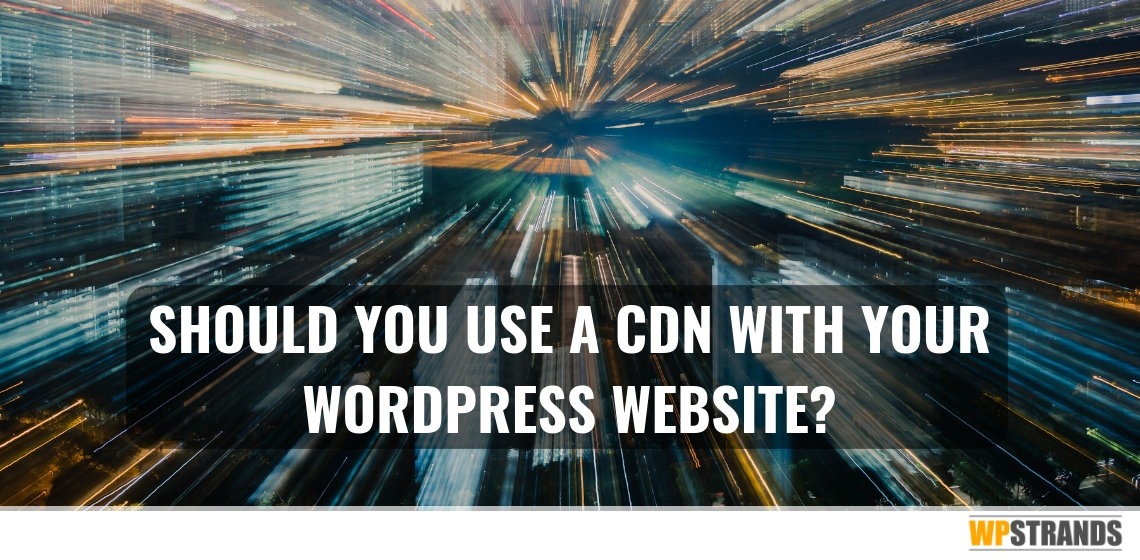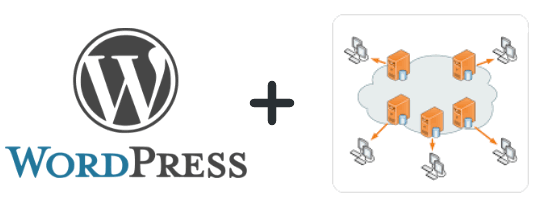
Imagine you live in the USA and you visit a WordPress website in Australia. The website’s server has to send every file for that web page from Australia to your browser in the US. That includes all image files, video files etc. Transferring data these days is fast, but it’s not instantaneous. As you can imagine, that downloading takes some time.
Now imagine you visit the same website again. But this time every file you need to download is sitting on a computer in a warehouse down the street from you. Clearly, the download would be faster, the website page would load quicker and you’d have a much more pleasant experience on that website.
That’s what a CDN does.
By now you must know that it’s all about speed on today’s web!
Next to choosing quality hosting, using a CDN will do more to improve your website speed than anything else.
That’s a grand claim, so read on to see what a CDN can do for you …
What Is A CDN For WordPress?
A Content Delivery Network is a network of servers (computers). It stores and delivers your WordPress website content to your website visitors.
The main purpose of this CDN is speed. The power of a CDN comes from the “Network” part of its name. This network of servers is typically distributed around the globe. All visitors to your site, wherever they are, will automatically use the server nearest to them.
Image by Kanoha [CC BY-SA 3.0 (https://creativecommons.org/licenses/by-sa/3.0) or GFDL (https://www.gnu.org/copyleft/fdl.html)], from Wikimedia Commons via Privacy Canada
As you can imagine this will give you a much faster page load experience.
A nice side-effect of having multiple servers with the same content is resilience. If any server is hacked or if it malfunctions, other servers can take its load. Thus a CDN has the added benefit of making a website more resistant to hacking attacks!
A Bit Of CDN History
CDNs came about due to the increase in multimedia use online. Larger video and audio files need more bandwidth. Companies started to use distributed servers to ease the bandwidth load on their main server.
As is typical, this technology has become more affordable and more available. Now anyone with a WordPress website can benefit from using some form of CDN.
How Does A CDN Work With WordPress?
A CDN consists of many computers around the world. Some of your WordPress content is stored on these computers. This includes any files you upload to your site such as images, audio or video.
When someone visits your website, their browser requests to download files for a web page e.g. an image. The CDN directs the browser to the computer nearest to the visitor. This end result is a faster load time for that visitor.
Only static files are stored on the CDN. Static files are those that do not change every time the website is loaded. Think images, videos, audio, maybe even HTML and CSS.
Dynamic files, such as the HTML of a blog page, are built each time the page loads so they will be sent from the original web server.
Static files tend to be the largest files on your site. By bringing those files nearer to your visitors you guarantee a faster experience for them.
[thrive_leads id=’6515′]
Do I Need To Use A CDN With WordPress?

Since speed is such a huge factor on the web these days, more and more people are considering a CDN as an essential part of their WordPress setup.
But it does come with a cost.
There’s a financial cost (if you don’t use a free CDN service) and a time cost for setup and management.
In the end, it’s entirely up to you as the website owner. How serious are you about your site? If it’s a hobby site with low traffic then maybe a CDN is overkill. But for anyone serious about growing their online business, a CDN is now almost mandatory.
Until a year or two ago, my own feeling on this was that paying for a CDN was unnecessary for most WordPress site owners. Most of those sites have low traffic and I viewed a CDN as something to ease bandwidth usage on high traffic sites.
Since then, however, I’ve changed my mind completely.
CDNs usually offer much more than a speed boost. e.g. Cloudflare also offers some basic security protection. The web application firewall that comes with our own plans at WPStrands also includes a fantastic CDN.
(I like to play a little trick on new customers. We don’t mention the CDN aspect of our firewall very much. So when we install the firewall, customers are amazed at the dramatic speed increase on their site! It’s nice to see the emails coming in with comments like “Wow! What have you done!? My site is flying”.)
Today, WordPress speed is more important than ever. WordPress security is more important than ever. How convenient that a CDN can help on both counts!
Once I started using a CDN, I was so impressed with the benefits that I couldn’t imagine not using one. I now think anyone serious about their online business should use one.
Where to get a CDN for WordPress – the options

As with most services like this, there are a huge number of offerings when it comes to CDNs. Both free and paid versions exist.
The easiest way
The easiest way, of course, is to sign up to one of our plans and let us do everything for you.
Both our Entrepreneur and Business plans include the excellent Sucuri website firewall/CDN combination. Those plans include full backups, updates, speed and security optimisation. It’s perfect if you’d prefer a hands-off approach to your website technology.
The free way
Jetpack
If you’ve used WordPress for any length of time, then you’re familiar with Jetpack.
Did you know that it includes a free CDN, called Image CDN? Although pretty limited, it could be a great way to try out a CDN for your basic WordPress site.
Cloudflare
Cloudflare believe everyone should have the benefit of a CDN and is probably the most popular free option out there. See more in the following section.
Incapsula
Incapsula have a generous free plan with basic security which is easy to set up, though I haven’t tried it yet.
Bigger Players
If you want to go with the big cloud players Amazon AWS, Google Cloud and Microsoft Azure all also offer free services for up to a year. This is more than enough time to test if it’s for you or not.
The Paid Way
I’ll just briefly mention some of the big players in the CDN arena. They’re professional services with great support – a must-have when adding this kind of complexity to your technical setup.
Among the largest players are
Sucuri
This is what we use and what we recommend if your site doesn’t have extremely high traffic. For a very low cost, you get the excellent Sucuri firewall and the CDN included. You get the best of both worlds: speed and security!
We include Sucuri in both our Entrepreneur and Business plans.
MaxCDN
Highly regarded in the WordPress space, MaxCDN offers what they call “stacks”; you purchase different functions such as a CDN, a Firewall etc. as you need them.
Cloudflare
Cloudflare is probably best known for providing free CDN services. Keep in mind the free service is pretty basic and the security aspects are limited compared to a low-cost option like Sucuri. But if you want to use a CDN with WordPress, this might be the best place to start.
Cloudflare’s CEO Matthew Prince says they will always offer a free version.
KeyCDN
Another highly respected CDN provider, KeyCDN offers pay as you use plans. This is great for smaller individual sites but you should be aware that a spike in traffic could cause those costs to jump suddenly.
The DIY way
I’ll have a separate post on how to set up Cloudflare free CDN by yourself coming soon. In the meantime check this post from Cloudflare themselves.
If you use a caching plugin like WP Rocket the setup is even simpler.
If you decide to pay for a CDN, I would advise you to get one that includes other useful services. This is why we offer the Sucuri firewall in our plans. As well as getting industry-best security protection, It includes a very impressive CDN that never fails to astonish customers when we install it and it starts to boost their site speed.
An Alternative Way
I’d be remiss not to mention an alternative if you’re somewhat technically inclined.
You can opt to use free cloud storage to serve your static WordPress content instead of serving it from your own web server. Obviously, this means your server has less work to do and it uses less storage space. But it takes some fiddling around with how your content is set up in WordPress to pull this off.
This post from Kinsta goes through some of the options.
Conclusion
Now you know what a CDN is and how it gives your website visitors a better experience when visiting your WordPress website.
While adding a CDN to the list of technologies you use for your business can seem complicated, there are free and low-cost options. Keep in mind they do add complexity to your setup and with that comes the need for extra technical skills or extra support.
If you need to know more about how we can significantly boost your WordPress website speed with our CDN, or how we can help you use a CDN for WordPress, drop us a line.


Do you use a CDN on your own site? Let us know your experiences below …